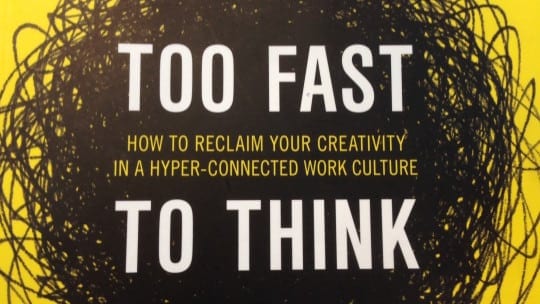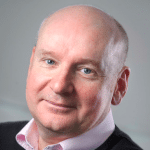
When was the last time you checked your work email? Was it less than a minute before you read the previous sentence?
When was the last time you received or sent a text message? Was it within the last half hour?
How about Twitter? Did you just take a break from reading the sentence above about text messaging and check out the latest results on the #TrumpRiot hashtag?
If you're reading this on a desktop, are you also sneaking peeks at your mobile device, which is opened to either Facebook or Snapchat?
Are you judged on the creativity of your work, as well as on the metrics showing the success of your communication efforts?
Ah, you just checked your work email again. Sorry to prompt you to do that.
Do you have multiple, overlapping deadlines and days stuffed with meetings, with no realistic hope of reading and replying to an endless overflow of queries and requests?
When you stop for a moment to face a creative challenge in the workplace, does your heart race while your mind goes blank?
If you answered yes to any one of these questions then you likely can answer yes to all of them. You're not alone, if it makes you feel any better. But that sense of us all being in the same boat does not diminish the price that's paid in squelched creativity.

"When people are under so much pressure to process information, the result is an unstoppable flow of data, an overloaded mind and consequently an analytical mindset," LEWIS founder and CEO Chris Lewis writes in his just-published book, "Too Fast to Think: How to reclaim your creativity in a hyper-connected work culture." In his book, Lewis, who has witnessed the effects of digital information overload in his own marketing communications agency and in his own life, compiles studies revealing the extent to which we're now burdened with content and demands created by the very technological advances that were supposed to make our work lives more efficient and creative. He also interviews artists, academics and business executives who have borne witness to the changes in the workplace and on the home front but have managed to find ways to create space and time for creativity.
Lewis allowed yet another distraction to enter his life by replying to some questions from PR News.
PR News: What differentiates communications professionals’ always-on, information-overload issues from those of other professional types?
Chris Lewis: They’re the ones looking out on the prow of the ship. Or they should be. News is like surf—you can either ride on top of it or be drowned by it. Our industry should be majoring on its situational fluency—the ability not only to drill down but to look across.
PR News: If you’re an employee with little influence in your workplace, how do you manage information overload and find time for creativity?
Lewis: By creating windows outside your working day. By getting out of the office for breaks. By checking email every 45 minutes rather than constantly. By switching off the alerts on all your social media.
PR News: If you’re a senior leader but not the arbiter of workplace culture, and the C-suite is apparently unaware of the costs of overload, what steps can you take?
Lewis: That’s more difficult. But if they’re any sort of a boss, then they will be interested in efficiency and well-being. Get them to experiment with having email-free pauses. If they don’t recognize the link between fun and competence, then go someplace else. All competence follows preference. It’s impossible to get good at stuff you don’t like.
PR News: If you’re a CEO, how do you set an example for the rest of your organization and make the case for creativity?
Lewis: This has to be a show, not tell, and it can’t be one rule for the CEO and one rule for another. You can set up pilot projects to test out the thinking. Experiment with new ideas. If you want success, you have to be prepared to fail. Taking risks means having a sense of humor. You should take this seriously. It shows timing, judgment, terms of reference, confidence, charm, etc.
PR News: In the closing notes of "Too Fast to Think," you talk about how the writing of the book forced you to confront your own challenges to be creative in the face of information overload and lack of sleep. What changes have you made in your own life since completing the book?
Lewis: I exercise more. I spend more time away from interruptions. I try to listen to people more. Being a good listener is difficult. The book itself changed me because I spoke to so many people from so many different fields. They all had the same problems with overload.
Follow Chris Lewis: @largeburrito
Follow Steve Goldstein: @SGoldsteinAI
